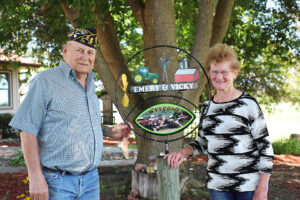
By Tim Engstrom
LAKE CITY — Born to Lawrence and Harriet Fick, Emery Fick grew up on the farm where he now lives along Wabasha County Road 2. There was a one-room schoolhouse across the road. After eighth grade, he didn’t continue to high school and instead helped on the farm.
By the time he was eligible to be drafted, he was working on another farm. The man from the fuel company wanted Fick to drive a truck but needed to know his draft status.
Fick went to the Reserve Center and signed up. Less than a week later, he was on a bus to the Twin Cities, then on a train to Fort Leonard Wood, Missouri. It was 1957.
He spent eight weeks at basic training, then on to Delaware, for six more months. His brother, Gerald, had helped at the farm, and once Emery returned, Gerald left for basic.
They were in the same unit, the 544th Ordnance Company out of Wabasha, and Emery’s job was engine repair. He became the sergeant in charge of the motor pool.

In 1961, they were activated. It was a tense moment in the Cold War — the Berlin Crisis.
But for any young readers, here’s the situation: After World War II, occupying forces had divided the city of Berlin and the country of Germany. The USSR occupied what became East Germany and eastern half of Berlin. Allied forces of the United States, United Kingdom and France occupied what became West Germany and the western side of Berlin.
The Soviets had wielded influence across Eastern European countries, including East Germany, and by the time of the Warsaw Pact of 1955, they had become puppet states. Hungary, for example, in 1956 had tried to revolt against Soviet rule. The revolution was crushed. This left West Berlin a free city inside a communist country during the Cold War — an age of nuclear diplomacy and proxy wars pitting communism against democracy.
In November 1958, Soviet Premier Nikita Khrushchev demanded the Western allies withdraw from Berlin in six months. The allies resolved to remain. After negotiations, Khrushchev dropped his ultimatum in 1959. He visited America and even visited a farm in Iowa and met with President Dwight Eisenhower at Camp David. Relations were on the mend.
But in June 1961, Khrushchev reissued the same ultimatum, further asking the allies to sign a peace treaty with East Germany and to end access to West Berlin by Dec. 31.
President John F. Kennedy the next month announced plans to expand the military, triple the draft and call up the Reserves. But it remained just plans for now.
On Aug. 13, East Germany closed its borders with West Berlin. Barbed wire, fences and troops secured the border areas while East German troops built the Berlin Wall. In response, Kennedy called up 148,000 members of the Reserves and National Guard to active duty.
Well, that meant the Fick boys.
“Both boys had to go,” Emery said.
Both were in the 544th. The unit went to Fort Polk, Louisiana, and spent 10 months there. Their folks and two sisters were nervous. Again, Emery was in charge of the motor pool.
“East Germany knew America was getting ready,” he said.
He has fond memories of the 544th’s time in Louisiana. He shared one story. The platoon lieutenant wanted to take a ride in a tank. His motor pool included tanks, so he took the guy out for a spin. He even let him drive one.
The lieutenant got going and then braked too hard, which caused the back end to pop up while the front end was on the forward part of the tracks.
“I told him, ‘Next time, don’t stop so fast,’” he said.
By October, other tanks were making news. Soviet and American tanks in Berlin were facing each other fully loaded at Checkpoint Charlie. Kennedy and his advisers were OK with the construction of the wall if the Soviet tanks backed off first. They did, one by one.
Once a Soviet tank moved back, an American one moved back, until they were all cleared.
A month after returning, Emery married Vicky. Their folks then moved into town and Emery and Vicky took over the farm. Gerald took over a farm across the road.
Emery had dairy and beef cattle, along with a rotation of crops, and eventually a trucking business.
As for the Reserves, he went to four more months of meetings after returning from Fort Polk, then was discharged.
In the 1970s, he started going to American Legion meetings at Lake City Post 110. Only three people came to the meeting, and there was no commander. Two months later, they named him the commander. He had experience with leadership from the Wabasha County Cattlemen.
Emery Fick ended up being the commander of Lake City Post 110 for 18 years. He also is a past Wabasha County commander and Area 1 vice commander for District 1.
The first thing he did was to get more members to come to the Post meetings. Membership grew. He worked to have a strong relationship with the Lake City VFW commander, and they began to do funerals together, which they still do today.
A Lake City Legion/VFW crew also travels to the Minnesota State Veterans Cemetery in Preston to decorate graves and to provide honors.
“It didn’t used to be that way,” Fick said, “but we improved relations when we started doing funerals. Now we do everything together. That was one of my accomplishments.”
Another was the Legion and Auxiliary rents 700 flags and posts them along the Lake City River Walk during Water Ski Days. Who leads the Auxiliary? Vicky has for 20 years.